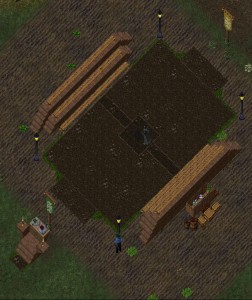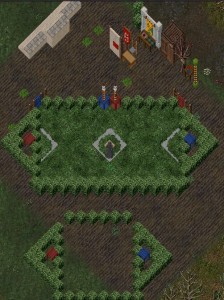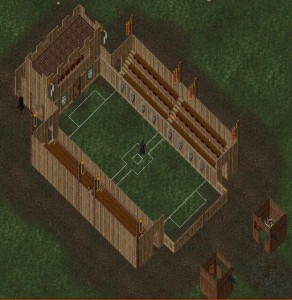Bagball is an in-game sport, unique to UO that has its roots in the town of Spiritwood, near Skara Brae on the Europa shard. Its initial creation is attributed to a player named Shri of Custodes Fati.
Players drew out their bagball field using common everyday items like staves, logs, and the like. European-style fields are approximately 15 tiles by 23 tiles with a centerline one tile wide.
Some of the best places to draw out a bagball pitch are the planting fields southeast or northeast of Skara Brae’s docks, west of the city of Britain, and east of the town of Haven
The first permanent bagball stadiums were built on farmland outside Britain, Felucca by Interest Game Master (IGM) Talos on Europa and Drachenfels, spring 2002
The location of this stadium, on both Drachenfels and Europa: Felucca, Britain farmlands, coordinates 1° 50′ N, 7° 1′ W
Asian-style fields are drawn diagonally, about 14 tiles x 8 tiles in size. The field location on all Japanese shards: Felucca, Britain farmlands, coordinates 8° 42′ S, 6° 57′ W
The Age of Shadows expansion, in 2003, brought us the two new towns of Luna and Umbra, and outside Luna, the Bagball Arena.
The essence of bagball: Two teams are pitted against each other in sporting event not dissimilar from soccer, football, and basketball. The object of the game is move a “bagball” around the field and into your opponent’s goal; the team that scores the most goals within two halves wins the match. In the event of a tie, the game is extended and the very next goal decides the winner. Optionally, the first team to score 5 points wins the match. Teams should wear an agreed ‘uniform’.
The Bagball
Originally the bagball itself was a bright yellow bag, with the arrival of the Malas Arena provisioners began selling a special, larger ‘bagball’ ![]() The ball is filled with an object or objects that weigh 400 stone – more than any character can carry. While impossible to store in one’s backpack, it is still possible to drag and throw short distances. A popular variation on the bagball was to use a large yellow crate for the bag, improving one’s chances of grabbing the “bagball” without it being inadvertently blocked. (Although a crate may sometimes be used instead of a bag, substitute names such as “boxball” are never used – the name always remains”bagball”)
The ball is filled with an object or objects that weigh 400 stone – more than any character can carry. While impossible to store in one’s backpack, it is still possible to drag and throw short distances. A popular variation on the bagball was to use a large yellow crate for the bag, improving one’s chances of grabbing the “bagball” without it being inadvertently blocked. (Although a crate may sometimes be used instead of a bag, substitute names such as “boxball” are never used – the name always remains”bagball”)
Playing Bagball
Each game pits two teams of 2 to 6 members each against each other. Both teams start on opposite sides of the bagball field near their respective goals. The bagball is placed in the center of the field, and a referee stands nearby. The referee counts “one, two, three” On “three” play begins and all participants race toward the center in an attempt to be the first to control the bagball.
Players grab and drag the bagball around the field as they attempt to throw the bag into opposition’s goal. The team that doesn’t have control of the bagball may attempt to grab and gain control of it at any point.
The referee will signal goals, the end of the first half, and the end of the game. Most bagball games typically are split into two 10 to 20 minute halves with a 3 to 5 minute interval at halftime. The referee will also signal the end of the game and declare the winning team.
At the end of the match, the team with the most goals wins the match. In the event of scores being tied at the end of the game, a Golden Goal situation will occur, resulting in the next team to score being named the winner.
Moving the bagball: The primary method is: stand next to it, lift it, drop it on the other side of you, and run past it to repeat the “lift, drop, move” process.
Trade windows: The bagball may not be passed to other players by using trade windows, and intentional use of this tactic may incur a penalty. The bagball should only be passed by placing it on the ground for another player (on either team) to grab.
Felucca: Most leagues hold their bagball games on Felucca, due to its stricter”push through” rules. When playing in Felucca, it is considered a natural part of bagball for players to block other players during the game.
Scoring a goal: This is a two part process: the bagball must first be thrown onto the opposition’s goal line and then into the goal itself. (Some Trammel games require the bagball to land before the goal line, and then into the goal in order to score.) This process allows players a fair opportunity to block the bagball before it lands in the goal and prevent the score. No goal will count as official until the referee announces it as such.
After each goal, the bagball is returned to the center of the field and each team moves to their own starting positions. (Some games may alternately allow the scoring team to begin at the centerline.) Play resumes at the signal of the referee. The team that scores the goal receives 1 point.
The team that scores the most points by the end of the game wins. Optionally, the team that first scores 5 points is declared the winner.
Penalties:
The actions listed below will often incur a penalty on the player/team performing the action. When the referee declares a penalty the game will stop and both teams will move to their starting positions. The opposing team will be awarded control of the bagball, and the referee will signal the continuation of the game. Once the bagball begins moving again, all players may begin moving.
- Holding onto the bagball for more than 5 seconds without also visibly dragging it
- Using a trade window to pass the bagball
- Intentionally blocking the bagball with equipped items, text spam, or any other manner
- Having more than 2 teammates standing within the goal area
- Using spells or magic of any sort (other than Night Sight)
- Using purple potions (some leagues disallow use of any potions)
- Using weapons or attacking another player
- Using the Stealing skill
- Using the Hiding skill
- Using pets, including ethereal mounts
- Moving the bagball outside the field
- Dropping additional bagballs on the field
- Excessive unsportsmanlike behavior
All decisions of the referee are final.
Criminal behavior: No player at any time should be flagged a criminal for any reason. Bagball may be a competitive sport but it is based purely on playing skill alone.
Attacks: Any participant that attacks any opposing team member or spectator will disqualify the whole team, and the opposing team will win the game by default.
Outside interference: Interference from spectators is not allowed, and any such interference may compel the referee to stop the game.



